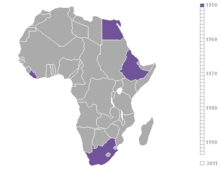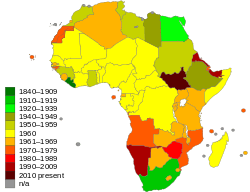Decolonisation of Africa

The Decolonisation of Africa followed World War II, when colonised peoples agitated for independence and colonial powers withdrew their administrators from Africa.[1]
Background
During the Scramble for Africa in the late nineteenth century, Western European powers divided Africa and its resources into colonies at the Berlin Conference of 1884-85.[2][3] By 1905, control of almost all African soil was claimed by Western European governments, with the only exceptions being Liberia (which had been settled by African-American former slaves) and Ethiopia (which had successfully resisted colonisation by Italy).[4] Britain and France had the largest holdings, but Germany, Spain, Italy, Belgium, and Portugal also had colonies. As a result of colonialism and imperialism, a majority of Africa lost sovereignty and control of natural resources such as gold and rubber. Following the concept of Rudyard Kipling's poem "The White Man's Burden", some Europeans who benefited from colonisation felt that colonialism was needed to civilise Africans.[5][6]
Causes

On February 12th, 1941, United States President Franklin D. Roosevelt and British Prime Minister Winston Churchill met to discuss the postwar world. The result was the Atlantic Charter.[7] It was not a treaty and was not submitted to the British Parliament or the Senate of the United States for ratification, but it turned to be a widely acclaimed document.[8] One of the provisions, introduced by Roosevelt, was the autonomy of imperial colonies. After World War II, the US and the African colonies put pressure on Britain to abide by the terms of the Atlantic Charter. After the war, some British considered African colonies to be childish and immature; British colonisers introduced democratic government at local levels in the colonies.
By the 1930s, the colonial powers had cultivated, sometimes inadvertently, a small elite of leaders educated in Western universities and familiar with ideas such as self-determination. These leaders came to lead the struggles for independence, and included leading nationalists such as Jomo Kenyatta (Kenya), Kwame Nkrumah (Gold Coast, now Ghana), Julius Nyerere (Tanganyika, now Tanzania), Léopold Sédar Senghor (Senegal), Nnamdi Azikiwe (Nigeria), and Félix Houphouët-Boigny (Côte d'Ivoire).
Timeline
This table is the arranged by the earliest date of independence in this graph; 58 countries have seceded.
See also
- Colonialism
- Decolonization
- Indépendance Cha Cha, a 1960 Congolese song widely considered as the anthem of African independence
- Economic history of Africa
- Scramble for Africa
- Wars of national liberation
- States and Power in Africa
- Year of Africa
Notes
- ↑ Birmingham, David (1995). The Decolonization of Africa. Routledge. ISBN 1-85728-540-9.
- ↑ "Berlin Conference of 1884-1885". http://www.oxfordreference.com. Retrieved 11 January 2015. External link in
|website=(help) - ↑ "A Brief History of the Berlin Conference". http://teacherweb.ftl.pinecrest.edu. Retrieved 11 January 2015. External link in
|website=(help) - ↑ Evans, Alistair. "Countries in Africa Considered Never Colonized". http://africanhistory.about.com. Retrieved 11 January 2015. External link in
|website=(help) - ↑ Siddiqui, Habib. "WHITE MAN'S BURDEN: THE NEVER-ENDING SAGA". http://www.iosworld.org. Retrieved 11 January 2015.
It was a “White man’s burden” to “civilise” the so-called “uncivilised”, “savage”, “Negroes!” Within a few years, the entire Africa was colonised by the Europeans, and her mineral resources looted out to Europe and her people put into chains to work
External link in|website=(help) - ↑ Gray, Richard. Francophone African Poetry and Drama: A Cultural History Since the 1960s. p. 8. ISBN 978-0-7864-7558-2. Retrieved 11 January 2015.
The mission to civilize the African continent has historically been referred to as the 'white man's burden'
- ↑ "The Atlantic Conference & Charter, 1941". https://history.state.gov. Retrieved 26 January 2015.
The Atlantic Charter was a joint declaration released by U.S. President Franklin D. Roosevelt and British Prime Minister Winston Churchill on August 14, 1941 following a meeting of the two heads of state in Newfoundland.
External link in|website=(help) - ↑ Karski, Jan (2014). The Great Powers and Poland: From Versailles to Yalta. Rowman & Littlefield. p. 330. ISBN 9781442226654. Retrieved 24 June 2014.
- ↑ Explanatory notes are added in cases where decolonization was achieved jointly by multiple countries or where the current country is formed by the merger of previously decolonized countries.
- ↑ Some territories changed hands multiple times, so in the list is mentioned the last colonial power. In addition, the mandatory or trustee powers are mentioned for territories that were League of Nations mandates and UN Trust Territories.
- ↑ The dates of decolonization for territories annexed by or integrated into previously decolonized independent countries are given in separate notes.
- ↑ The Union of South Africa was constituted through the South Africa Act entering into force on 31 May 1910. On 11 December 1931 it got increased self-governance powers through the Statute of Westminster which was followed by transformation into republic after the 1960 referendum. Afterwards, South Africa was under apartheid regime until elections resulting from the negotiations to end apartheid in South Africa on 27 April 1994 when Nelson Mandela became president.
- ↑ On 28 February 1922 the British government issued the Unilateral Declaration of Egyptian Independence. Through this declaration, the British government unilaterally ended its protectorate over Egypt and granted it nominal independence with the exception of four "reserved" areas: foreign relations, communications, the military and the Anglo-Egyptian Sudan.[14] The Anglo–Egyptian treaty of 1936 reduced British involvement, but still was not welcomed by Egyptian nationalists, who wanted full independence from Britain, which was not achieved until the 1952 revolution. The last British troops left Egypt after the Suez Crisis of 1956.
- ↑ King, Joan Wucher (1989) [First published 1984]. Historical Dictionary of Egypt. Books of Lasting Value. American University in Cairo Press. pp. 259–260. ISBN 978-977-424-213-7.
- ↑ Anglo-Egyptian Condominium Agreement of 1899, stated that Sudan should be jointly governed by
.svg.png) Egypt and Britain, but with real power remaining in British hands.[16]
Egypt and Britain, but with real power remaining in British hands.[16] - ↑ Robert O. Collins, A History of Modern Sudan
- ↑ Cape Juby was ceded by Spain to Morocco on 2 April 1958. Ifni was returned from Spain to Morocco on 4 January 1969.
- ↑ The British Togoland mandate and trust territory was integrated into Gold Coast colony on 13 December 1956.
- ↑ After the French Cameroun mandate and trust territory gained independence it was joined by part of the British Cameroons mandate and trust territory on 1 October 1961. The other part of British Cameroons joined Nigeria.
- 1 2 Senegal and French Sundan gained independence on 20 June 1960 as the Mali Federation, which dissolved a few months later into present day Senegal and Mali.
- ↑ The Trust Territory of Somalia (former Italian Somaliland) united with the State of Somaliland (former British Somaliland) on 1 July 1960 to form the Somali Republic (Somalia).
- ↑ Independent Benin unilaterally annexed Portuguese São João Baptista de Ajudá in 1961.
- ↑ Part of the British Cameroons mandate and trust territory on 1 October 1961 joined Nigeria. The other part of British Cameroons joined the previously decolonized French Cameroun mandate and territory.
- ↑ After both gained independence Tanganyika and Zanzibar merged on 26 April 1964
- ↑ The Spanish colonial rule de facto terminated over the Western Sahara (then Rio de Oro), when the territory was passed on to and partitioned between Mauritania and Morocco (which annexed the entire territory in 1979), rendering the declared independence of the Saharawi Arab Democratic Republic ineffective to the present day (it controls only a small portion east of the Moroccan Wall). The UN still considers Spain as administrating country of the whole territory,[26] awaiting the outcome of the ongoing Manhasset negotiations and resulting election to be overseen by the United Nations Mission for the Referendum in Western Sahara. However, the de facto administrator is Morocco (see United Nations list of Non-Self-Governing Territories).
- ↑ UN General Assembly Resolution 34/37 and UN General Assembly Resolution 35/19
References
- Ali A. Mazrui ed. "General History of Africa" vol. VIII, UNESCO, 1993
- Chafer, Tony. The end of empire in French West Africa: France's successful decolonization (Bloomsbury Publishing, 2002).
- Clayton, Anthony. The wars of French decolonization (Routledge, 2014).
- Cooper, Frederick. Decolonization and African society: The labor question in French and British Africa (Cambridge University Press, 1996).
- Michael Crowder. "The Story of Nigeria" Faber and Faber, London, 1978 (1962)
- Dávila, Jerry. "Hotel Tropico: Brazil and the challenge of African Decolonization, 1950–1980." Duke University Press, 2010. ISBN 978-0822348559
- Gordon, April A. and Donald L. Gordon, Lynne Riener. Understanding Contemporary Africa (London, 1996).
- Rothermund, Dietmar. The Routledge companion to decolonization (Routledge, 2006), comprehensive global coverage; 365pp*Kevin Shillington "History of Africa" St. Martin's Press, New York, 1995 (1989)
- Khapoya, Vincent B. The African Experience (1994)
- White, Nicholas. Decolonization: the British experience since 1945 (Routledge, 2014).
External links
- Africa: 50 years of independence Radio France Internationale in English
- "Winds of Change or Hot Air? Decolonization and the Salt Water Test" Legal Frontiers International Law Blog